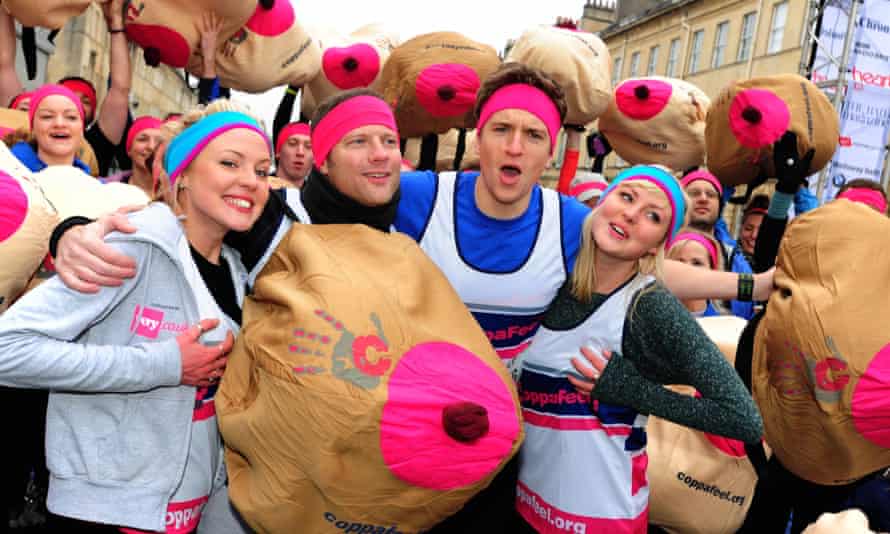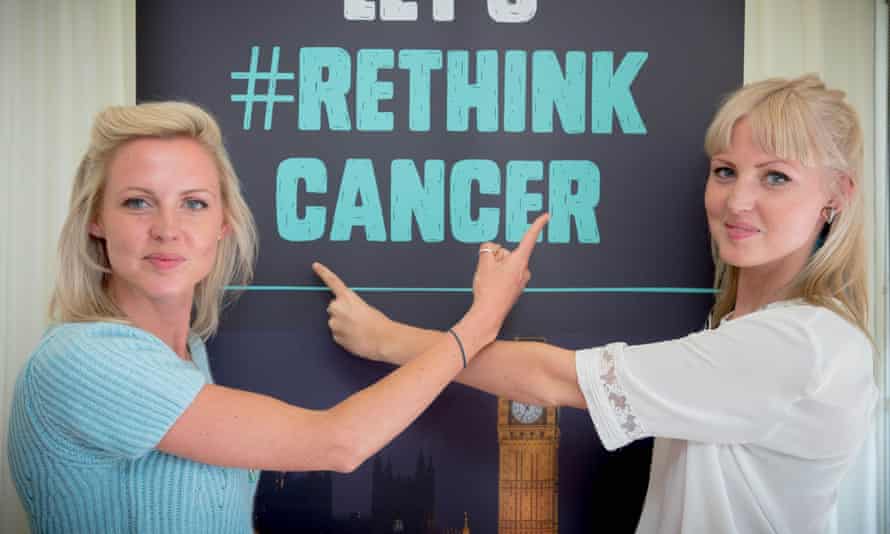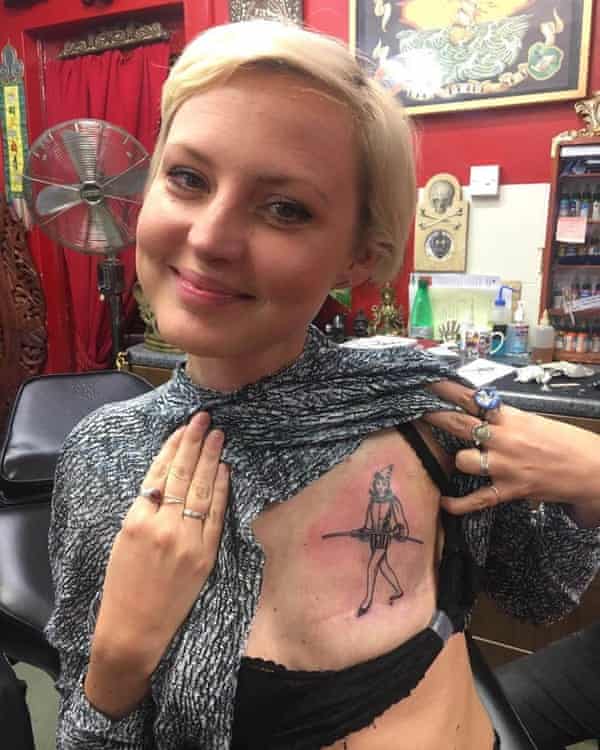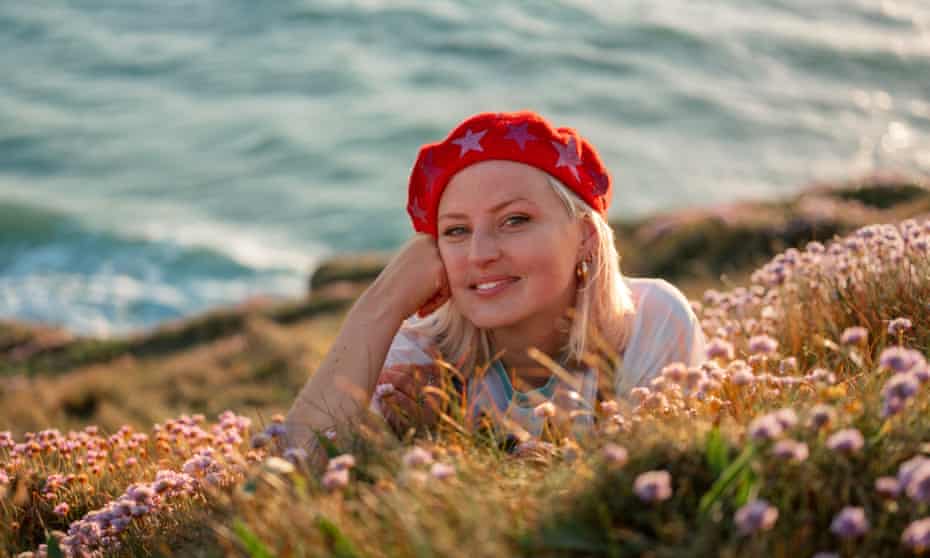Eight months before Kris Hallenga was diagnosed with stage four breast cancer that spread to her spine, she went to her GP about a lump. It was 2009, she was 23 years old and, she says, “actually very miserable”, having just come out of a crummy relationship. Living in Beijing, she was working for a travel company, and teaching on the side, but had come back home to the Midlands to visit her mum and get some teaching qualifications. “The doctor said: ‘It’s hormonal changes, something to do with the pill.’ I was on the mini-pill at the time. ‘Take some evening primrose oil to help with the pain.’” Hallenga wasn’t about to argue: she was due back in China, and the last thing she wanted was to wait around for more tests.
In Beijing, the lump got more painful, and blood started leaking from her breast. She had bouts of feeling unwell, which she couldn’t explain. She came back to the UK, saw a different GP, but was told again that she was probably undergoing hormonal changes and that she didn’t even need to be examined because she had been seen six months before. To this day she is terribly, if ruefully, understanding about what happened. “The chances of a GP seeing a young patient with breast cancer are so slim. What she should have said is: ‘I’m not worried about this right now because if you’re not checking your boobs anyway, you don’t know if this is normal for you.’ I wasn’t touching my boobs at all. I didn’t know anything about them.”
Hallenga’s mum, on the other hand, was anxious – her own mother had had breast cancer in the 1950s, before she was 30. She insisted her daughter go back and get a referral to a breast clinic, which Hallenga did. If Hallenga had been over 30, she would have been seen within two weeks; as it was, she just had to keep calling on the off-chance there was a cancellation. Even her first consultant couldn’t really believe it was anything serious, and told her to come off the pill and return in three weeks.
After a biopsy and a mammogram, Hallenga was diagnosed with breast cancer; at this point, her back pain was becoming an ominous sign, and a week later, cancer was found in her spine. “When they find breast cancer, and think that’s still just primary, that’s when it’s urgent. It’s all very fast-moving. As soon as there’s a secondary, everything grinds to a halt. The questions change. Suddenly, they’re more like: ‘What is the most important thing as you see it? Pain? Right, let’s fix the pain.’ It’s palliative care at that point.”
I meet Hallenga, now 35, in Newquay, outside a cafe on a blowy day, and she looks 100% Cornwall: hardy, surf-ready, relaxed. But back then, it wasn’t so much that Hallenga wasn’t ready to give up; she was just “confused and baffled by the whole thing. I kept thinking: ‘This is bullshit. Why didn’t anyone tell me to check my boobs? Why didn’t I know I could get breast cancer at 23? I’m pretty sure my friends don’t know either, and, if none of us do, then literally no young person in this country fucking knows this secret. This needs to change.’ And I got this wave of energy.”

So in 2009, while having radiotherapy on her spine “just to be able to walk without crying”, and embarking on chemo to shrink the tumour in her breast, Hallenga started the charity CoppaFeel!. It has three missions: to get all young people to check their boobs and pecs regularly, so they know what’s normal; to familiarise them with the symptoms of breast cancer; and to empower them when they’re seeking medical help. Last year, more than a million young people were sent a text to remind them to check their breasts. “The charity is now the third most recognised cancer charity in the UK,” she says, “and is actually saving lives, which blows my mind all the time.”
She started the charity in a festival field. Hallenga, with no hair, looked like “the classic cancer patient, although I still had eyebrows”. She also had tons of energy, many of her friends with her, a tent, some stickers and some face paint. That was enough to begin having conversations with people about their breasts and whether they ever checked them. “I was riding this high,” she remembers. “I never had low blood cell counts, I never missed any of my chemo sessions, and I partly put that down to the fact that I was just buzzing.”
With hindsight, there was an element of displacement activity. Campaigning was filling the space that would otherwise be full of prognostication and anxiety – she had not even asked her consultant about survival rates. But she also did it for her friends. “When someone is diagnosed with breast cancer, it’s almost as if a silence, a gap or a moment has to be filled because it’s so heavy and so tragic. The cancer patient usually feels as if they have to fill it, and they have to say: ‘It’s OK,’ when it’s not. I gave my friends something to do. I needed them to help with the charity, they all said ‘Brilliant’, and I thought: ‘You’re just saying that because I’ve got cancer and you don’t want to disagree with me, but that’s cool.’”
The same year, she won a Pride of Britain award, after being nominated jointly by Cancer Research UK (for whom she had done an advert) and her mum. “I’d just finished the chemo, I had to have my mastectomy, and I really did feel as if it were groundhog day. I couldn’t get out of bed, I didn’t have any energy, I was bloated, I didn’t recognise myself. I was just a ghost lady. When Pride of Britain happened, I swear to God, that made my hair grow back. Really fast.”
Pictures from the time bring her campaigning approach vividly to life. “I’d talk to young people, and they could make the connection just by looking at me: this is someone who’s got diagnosed, and she’s still having fun. There is life with cancer, maybe. If you’re telling young people that cancer’s the shittest thing ever, and you’re going to die from it, that’s not going to make them change their habits. It’s not going to change anything.”

Winning Pride of Britain came with an invitation to Downing Street; here Sarah Brown, wife of Gordon, entered the picture. Hallenga was trying to get CoppaFeel! registered as a charity. She had raised the money (at that point, organisations needed £5,000 in reserve funds) and had a plan beyond festivals: going into schools, offices, mother-and-baby groups – anywhere young women congregate – with her twin sister, Maren, and her army of “Boobettes”, women diagnosed when under 35 who wanted to share their stories. The wheels of the Charity Commission were grinding slowly, but Sarah Brown made a call, asked them to hurry up and solved this problem overnight.
At the same time, Hallenga was ready for a mastectomy. “I didn’t care about the breast. I didn’t want to die. I would have done anything at that point. I’ve never thought my boobs define me.” There was a lot of talk about reconstruction: “There was always a man sitting in front of me, saying: ‘We’re going to take away your boob, and then you can have something to replace it.’ No one ever said: ‘How do you feel about it?’ Because I would have said: ‘I don’t give a fuck.’ As I did, a year later. And then, last year, I said: ‘I want the other one gone.’ I’d just had enough after 11 years of being lopsided.”
Her spine was a whole other battlefield. The tumour there was gone but the radiotherapy had crumbled her vertebrae, and she had to have them filled with bone cement, a gruelling operation called a vertebroplasty that has to be done under local anaesthetic to check you can still move your feet. “The worst day of my life,” she says with feeling.
All through this, she was living in London with a guy she had got together with at her first CoppaFeel! festival, running the charity and starting the conversations that would save innumerable people from going through the same ordeal she did. “We were the first people to get nipples on billboards,” she says proudly, “and on daytime TV.” The rise of CoppaFeel! coincided with a new spirit of physical openness, though she thinks it would be conceited to take the credit for that. “I have conversations now with people in their teens and early 20s that would have made me die inside. When I first had that conversation with the GP, I hated every single moment. I was ashamed of everything, I was ashamed of all my thoughts, and my body. Now people are totally chill. That’s going to make such a significant difference.”

After four years, though, it was clear her relationship wasn’t working. “There is enormous pressure on a relationship when someone is terminally ill. He found it very hard to acknowledge my illness. At first, I thought: ‘Cool, then we don’t have to talk about it, and it doesn’t exist and we can live a normal life like everyone else. But there would always be days when I thought: ‘It would be quite nice if I could talk about this right now, if you did hold my hand and comfort me, if you came to the hospital with me.’ He never did those things. He never discussed it.” She has been single since, and says wryly: “I feel no fomo when it comes to relationships because I haven’t seen anything that’s worth fighting for or going out for.”
Underneath that is a bleaker realism: “I have seen too many husbands and boyfriends who have been left behind. I’ve seen the heartbreak too many times, and I don’t want to do that to someone.” Although she did not go to support groups, her campaigning drew her close to people in similar situations. “They’ve all died on me. I don’t want to make friends with new people any more; there’s only so much I can handle.”
Nevertheless, she focuses insistently on her good fortune; in this context, it’s counting as a blessing that she never had a timetable for marriage or kids, so is not plagued by that as many young long-term cancer patients are. “I know so many people thinking: ‘This is not how my life was meant to be. I was meant to have a child by now.’ I would be shattered by that. And there’s not much fertility support.” She illustrates the point with a stark recollection from her first ever round of chemo. She wasn’t at all broody, but she didn’t want the decision just taken out of her hands. So she called her oncologist the day before her treatment to ask about freezing her eggs. He asked: “Who’s to say you’re going to be alive in 10 years to look after them?” “What he could have said – and this would have been way kinder – is: ‘There’s a bit of an urgency to your treatment, and egg harvesting takes for ever.’”
In 2011, just after the vertebroplasty, a CT scan picked up tumours in Hallenga’s pelvis and hips. Since then, routine scans have picked up often symptomless tumours in her liver and, repeatedly, her brain. At the start, there’s what she describes as a cabinet of options, and as time goes on, “it’s just terrifying because you reopen the cabinet and you’re like: OK, so we’ve only got this drug left”. Treatments are tried whose long-term effects are unknown. “We don’t have remission, we have stability. That’s when a cancer is not doing anything, not active, asleep. My former oncologist used to call them dead pigeons. I don’t know why.”

In 2017, she stepped aside as CEO of CoppaFeel! – it’s now run by Natalie Haskell – to move to Cornwall, spend more time with her sister and write a memoir (which is coming out this August). Also, she says, she thinks “it’s important for charity founders to not get cocky and think: ‘I’m gonna run this thing for ever’. Move over and let someone else have a chance. They might have even better ideas.”
Maren, she says, “is incredible, very stoic. I think we have appropriate roles in terms of me: the invalid; her: the person who can deal with an invalid. I have no idea how it feels for her, though, because I don’t even want to dare to think about the scenario being the other way round.” Eighteen months ago, Maren had a son, Herbie. “It’s almost as if he took the pressure off me to be everything in her life. She has a new everything.” The cancer has been a double pressure, the weight of mortality on one side, the desperation of loved ones on the other. “Cancer patients are always told to keep fighting, to keep being this survivor, to be a warrior. It’s such a taboo to say: ‘Enough. I don’t want to fight any more.’ I want to be able to say that, and I will say it when the time comes. But I haven’t been anywhere near that yet.”
Hallenga’s pigeons have been dead since 2018, the longest period of stability she has known since her diagnosis. She has survived far longer than anyone could have expected in 2009. She has had treatments that weren’t even invented back then. Nobody can explain her longevity, but she says: “I really think a massive chunk is having this sense of purpose and drive to survive because I still have things to do, to prove and to achieve. I think that’s boosted every cell in my body. Every single cell is thinking: ‘We have to stick around for this.’”
from Lifestyle | The Guardian https://ift.tt/3eXaDkM
via IFTTT

comment 0 Comment
more_vert